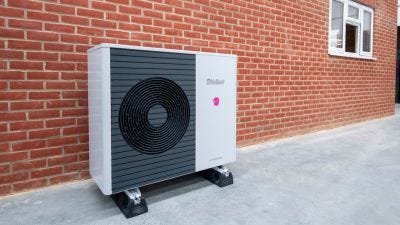ESTea #20 20/10/21
Heat pumps have been in the news over the last week principally because of a government announcement here in the UK. The Conservative Government has promised grants of up to £5,000 for homeowners and renters to have them installed, a sum which covers around a third of the cost of the installation of a heat pump.
This might look like a good investment opportunity. Free government money for thousands of people to upgrade their boilers and save money. It’s a win-win-win. Private equity could invest in installers, equity funds can look for listed heat pump manufacturers. There’s plenty of opportunities, surely?
Except that there is not. As things stand, no one will be cashing in on heat pumps and it’s not a good opportunity. I can explain why.
Honestly, heat pumps are the coolest thing and one of their best tricks is that you can reverse the same pieces of equipment and turn your heat pump into an air conditioner. Almost every air-to-air heat pump is also an air conditioner for no extra cost and considering that over a third of the world’s population lives in places where you need to heat your house in winter and cool it in summer, I think this alone is worth it.
Heat Pumps are awesome little pieces of technology which completely warp your understanding of physics by ‘extracting heat from the air’, even when it’s cold outside. If a home is tepid and the outside is cold, then it doesn’t make sense that you can take heat from the outside to the inside – but you can. The phenomenon is related to the temperature at which refrigerants condense, and how condensation imparts a great deal of heat, and the below video explains it further.
Heat pumps can blow air directly into a room (air-to-air) or they can be used to heat water which goes into the central heating (air-to-water). The context in which everybody is talking about heat pumps is retrofitting. Most new properties come with HVAC systems that have heat pumps, but the majority of the UK housing stock is old and needs to be retrofitted (i.e. replace the gas water boiler).
That means you can’t use an air-to-air heat pump, but instead you need an air-to-water pump. Remember this as it will become important later.
Most of the media criticism has concentrated on fairly petty details like noise and efficiency at low temperatures. These are non-issues. At low temperatures, you can add more mechanical heating and the noise is already minimal and outside your house. It’s no louder than your neighbour’s kitchen fan.
Similarly, people have complained of a ‘skills gap’ to installing heat pumps. The installer does need to be a gas and heat engineer but systems come self-contained and preassembled, and they plug directly into existing plumbing. The installation itself is about on par with a new boiler and much of the hard work can be completed by a non-specialist.
The real problem is that heat pumps cost the user loads of money, every year, to have attached to their home (mostly due to existing government policies; more on that later).
The average UK household uses ~13,000 kWh of gas every year. For the sake of ease, let’s imagine that all that gas is used in central heating and hot water so the homeowner would need to replace roughly that much household heating each year with a heat pump.
Heat pumps have a figure called COP or SCOP (Seasonal Coefficient of Performance) which measures how much heat energy they can generate per unit of electricity (over all seasons). If a heat pump has a SCOP of 2, then for every kilowatt-hour of electrical energy you put in, you’ll get two kilowatt-hours of heat energy out.
Some air-to-air heat pumps have SCOP as high as 4 to 5 and these are the numbers used in pollyanna calculations about the benefits of heat pumps and why you should have on installed in your house. Air-to-air heat pumps are far more efficient than air-to-water heat pumps and the best air-to-water heat pumps have a SCOP of around 3.
13,000 kWh of heating energy now requires 13,000/3 = 4300 kWh of electrical energy. Electricity prices have gone up because of market factors but also because of government ‘Green’ policies (we’ll come back to that) and now the average price is over 15p per Kwh. So your average consumer is going to be paying £645 a year to heat their home (not to mention cooking etc).
The only problem is that currently, the average yearly gas bill in the UK is £550. This means that consumers will be paying at least £100 a year for the privilege of having a heat pump bolted to the side of their house. Not a great deal when you consider that heat pumps cost a great deal more than £5000 to buy and fit.
I think it’s safe to say that there won’t be a rush to the door for heat pump installation companies in the next 12 months.
*Okay, so how did the government make electricity expensive with their ‘Green’ policies?
Over the last ten years, there’s been a big push by this government to implement a market-based system to promote renewable energy generation and the approach was broadly successful.
Without going into the details, there are a series of policies that charge only electricity providers and pass that money onto renewable energy generators. In the highly competitive UK energy delivery sector, the majority of these costs are passed onto consumers but only on their electricity bills.
The National Audit Office estimates that those charges come to £132 per year. About the amount that you’ll be out of pocket if you install a heat pump…
